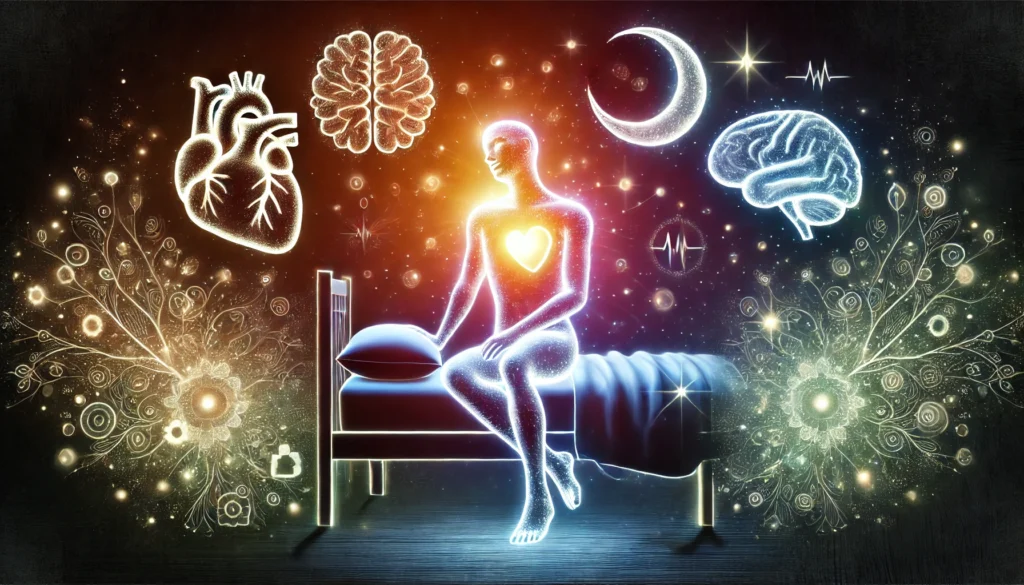Sleep is a vital part of our lives. It’s a time for our bodies to rest, rejuvenate, and prepare for the next day.
But how much sleep do we really need?
This question becomes particularly relevant when we consider the unique sleep needs of different age groups. For instance, how much sleep do 19 year olds need?
This article aims to answer that question. We’ll delve into the science of sleep for young adults, exploring the factors that influence their sleep patterns and needs.
We’ll also discuss the consequences of sleep deprivation and provide practical advice on how to optimize sleep for better health and cognitive function.
Whether you’re a 19-year-old seeking to improve your sleep, a health and wellness coach, a science journalist, or a biohacker, this comprehensive guide is for you. Let’s dive in.
You May Also Like: Sleep Hygiene: Key Practices for Health
Understanding Sleep Needs for Young Adults
Young adults are at a unique stage in their life. Their bodies and brains are still developing, requiring specific sleep patterns to function best.
The National Sleep Foundation suggests that people aged 18 to 25 need 7-9 hours of sleep nightly. This recommendation reflects the need to balance academic, social, and work commitments with healthy rest.
Sleep plays a crucial role in memory consolidation, learning, and emotional regulation. Quality rest helps maintain concentration and mental agility, which are vital for daily life.
Understanding sleep needs involves considering individual differences. Some young adults may function well with 7 hours of sleep, while others might need closer to 9.
Here are key components that influence young adults’ sleep needs:
- Individual lifestyle choices and responsibilities
- Genetic predispositions affecting circadian rhythms
- Academic pressures and social activities
Recognizing these factors can help tailor effective sleep strategies. Awareness of personal sleep requirements allows for more informed decisions, promoting better health and performance.
The Science of Sleep for 19-Year-Olds
The science of sleep is both fascinating and complex. It reveals how vital sleep is to cognitive and physical health. At 19, individuals experience a delayed circadian rhythm. This causes them to feel more alert at night, affecting sleep timing.
Understanding sleep cycles is crucial. Our sleep is divided into rapid eye movement (REM) and non-REM stages. Each stage serves a unique purpose in physical repair and memory processing. REM sleep is particularly beneficial for cognitive processes, supporting learning and emotional health.
Quality sleep influences hormone production. It regulates hormones such as cortisol and melatonin. Melatonin helps align the sleep-wake cycle, while cortisol prepares the body for waking. For young adults, achieving enough restorative sleep is crucial for academic success and emotional well-being.
How Much Sleep Do 19-Year-Olds Really Need?
So, how much sleep do 19-year-olds truly need? The consensus among experts is that 7-9 hours nightly is ideal. While the needs may vary, sticking within this range is generally beneficial.
Young adults often underestimate the importance of sleep. Academic stress and social engagements push sleep off the priority list. Sleep becomes sidelined, yet it’s vital for overall functioning.
Failing to get enough sleep can lead to several issues. These include increased anxiety, difficulty concentrating, and reduced physical performance. Chronic sleep deprivation could seriously affect both short-term and long-term health.
To better understand the essential sleep requirements:
- Align with natural circadian rhythms by keeping a consistent schedule
- Avoid caffeine and electronic exposure before bedtime
- Create a calm, dark environment conducive to rest
By adhering to these practices, 19-year-olds can optimize their sleep, boosting energy and cognitive function. Knowing how much sleep the body needs contributes to vibrant health and well-being.
Factors Affecting Sleep in Young Adults
Many factors contribute to the sleep patterns of young adults. Stress, academic pressures, and lifestyle choices influence how they sleep. Sleep can be further disrupted by modern technology, specifically the exposure to blue light before bed.
Biological factors also come into play. The body’s natural sleep-wake cycle, the circadian rhythm, shifts during adolescence. This makes it harder for young adults to fall asleep early, pushing sleep times later.
Environmental influences are significant as well. Dormitory living and social life can impact consistent sleep patterns. Such disruptions make it challenging to maintain a routine sleep schedule.
Social obligations and irregular schedules often complicate achieving sufficient sleep. Navigating these factors requires awareness and strategy. By acknowledging and addressing these influences, young adults can improve their sleep quality, leading to better overall health and performance.

The Consequences of Sleep Deprivation
Sleep deprivation can significantly affect a young adult’s health. It increases vulnerability to both physical and mental health problems.
Chronic lack of sleep disrupts the body’s immune response. This disruption heightens the risk of infections and illnesses. Long-term sleep deprivation may also contribute to more serious conditions like obesity and cardiovascular issues.
The impact extends beyond physical well-being. Insufficient sleep can impair cognitive functions, affecting memory and decision-making abilities. Emotional stability is also at risk, with increased chances of experiencing anxiety and depression.
Here are some common effects of inadequate sleep on young adults:
- Reduced focus and increased errors in tasks
- Heightened stress levels and mood swings
- Greater likelihood of unhealthy weight gain
Recognizing these consequences emphasizes the importance of prioritizing adequate sleep. By addressing sleep deprivation, young adults can enhance their mental and physical health, leading to a more balanced life.
Physical Health Risks
The physical health risks of sleep deprivation are profound. A weakened immune system is one of the most immediate effects. This makes the body more susceptible to common ailments like colds.
Sleep loss also disrupts metabolic processes. It can lead to weight gain by affecting hunger-regulating hormones like ghrelin and leptin. This imbalance increases cravings, particularly for high-calorie foods.
Furthermore, there’s a connection between inadequate sleep and heart health. Lack of sleep can lead to increased blood pressure and inflammation. These factors raise the risk of cardiovascular diseases over time.
Ensuring adequate sleep is essential for maintaining physical health. Prioritizing sleep can prevent these risks and improve overall well-being.
Cognitive and Mental Health Impacts
Sleep deprivation doesn’t just affect the body. It also has profound effects on the mind. Cognitive functions decline when deprived of sleep, impacting memory and learning capacity. This can result in difficulty with concentration and slower processing speeds.
Mental health suffers as well. There is a strong link between poor sleep and mood disorders such as depression and anxiety. Insufficient sleep exacerbates symptoms, making them harder to manage.
Sleep also impacts emotional regulation. A lack of rest often leads to irritability and reduced resilience to stress. This can make young adults more prone to conflicts and unable to handle everyday challenges effectively.
Addressing sleep needs is crucial for mental clarity and emotional balance. Quality sleep enables cognitive and emotional health, supporting better mental performance and happiness.
Optimizing Sleep for Better Health and Performance
Optimizing sleep enhances overall health and boosts performance, both mentally and physically. For young adults, understanding sleep’s impact is vital for maintaining energy and productivity levels.
Adopting a holistic approach can lead to better sleep quality. This involves addressing various lifestyle factors that affect sleep, including diet, exercise, and stress management. Even small adjustments in daily routines can result in significant improvements.
Maintaining consistency with sleep schedules can also support optimization efforts. Going to bed and waking up at the same time each day helps regulate the body’s internal clock. This consistency enhances the quality and depth of sleep.
By focusing on these strategies, young adults can experience the full benefits of rest. Optimized sleep can improve cognitive function, emotional resilience, and physical health, thus contributing to a more vibrant and successful life.
Sleep Hygiene Best Practices
Good sleep hygiene is crucial for fostering quality sleep. Implementing effective practices can create a conducive environment for rest.
To start, setting a regular sleep schedule is essential. Consistency helps in establishing a natural sleep-wake cycle. Additionally, creating a calming bedtime routine can signal the body to wind down. Activities like reading or taking a warm bath can aid relaxation.
A sleep-friendly environment also plays a pivotal role. Keep the bedroom cool, dark, and quiet for optimal sleep conditions. Limiting noise and light exposure can enhance the quality of rest.
Some best practices for better sleep hygiene include:
- Avoiding caffeine and heavy meals close to bedtime
- Limiting naps to early in the afternoon, if needed
- Reducing screen time at least an hour before bed
Incorporating these habits can significantly improve sleep quality. By following these practices, young adults can enjoy more restorative and rejuvenating rest.
The Role of Diet and Exercise in Sleep Quality
Diet and exercise are powerful allies in enhancing sleep quality. They influence both the duration and the restful nature of sleep.
Eating a balanced diet supports sleep by providing the necessary nutrients. Foods rich in tryptophan, magnesium, and melatonin are particularly beneficial. These compounds promote relaxation and aid in the natural sleep cycle.
Regular physical activity, on the other hand, boosts sleep by reducing stress and anxiety. Exercise increases the time spent in deep sleep, the most restorative phase. Importantly, exercise should be scheduled thoughtfully. Engaging in intense workouts right before bed can be stimulating, so earlier is often better.
By aligning diet and exercise with sleep objectives, young adults can improve their sleep quality. These lifestyle choices are integral to achieving refreshing and uninterrupted sleep, enhancing overall well-being.
Navigating Sleep Challenges: Stress, Electronics, and Social Pressures
Young adults often face obstacles that disrupt sleep, such as stress, electronic use, and societal pressures. Addressing these challenges is critical for better rest.
Stress is a major sleep disruptor. It can keep the mind active, hindering relaxation. Techniques like meditation or deep breathing can alleviate stress and promote calmness before sleep.
Electronic devices add to the challenge by emitting blue light. This light interferes with melatonin production, making it harder to fall asleep. Reducing screen time an hour before bed can help align with the body’s natural sleep cycle.
Social pressures also influence sleep patterns. Night outings or late-night studying can clash with sleep schedules, leading to reduced rest. Setting clear boundaries about sleep priorities is essential.
By tackling these challenges head-on, young adults can improve sleep quality. Approaches like managing stress, controlling electronics usage, and setting social boundaries support restorative sleep. These strategies not only enhance sleep but also contribute to better health and performance overall.

Biohacking and Advanced Strategies for Enhanced Sleep
Biohacking offers innovative ways to improve sleep beyond traditional methods. Through a combination of technology and self-experimentation, individuals can fine-tune their rest for maximum benefits.
One advanced strategy involves manipulating sleep environments. This can mean optimizing room temperature or using blackout curtains to enhance darkness. Adjustments like these align with the body’s circadian rhythms, promoting deeper sleep.
Chronotherapy is another biohacking approach that uses light exposure to regulate sleep cycles. By controlling when and how much light you’re exposed to, you can influence melatonin production, thus shifting your sleep patterns in a healthful direction.
These biohacking techniques require a degree of trial and error but offer promising results. By customizing your sleep routine with these advanced strategies, you can work toward more restful and restorative sleep.
Nootropics and Supplements for Sleep Optimization
Nootropics and supplements are gaining attention for their potential to enhance sleep. These compounds can support relaxation and improve sleep quality when used wisely.
Melatonin is a popular supplement known for regulating sleep-wake cycles. It’s most effective for those adjusting to new time zones or erratic schedules, guiding the body towards rest. However, it’s vital to use melatonin judiciously to avoid dependency.
Other supplements like magnesium and valerian root target relaxation and stress reduction. These can ease the transition into sleep, fostering a more restorative sleep experience. While promising, it’s essential to consult healthcare professionals before starting any supplement regimen.
Incorporating nootropics and supplements can complement other sleep strategies. When carefully selected and integrated, they can be valuable tools for achieving enhanced sleep. Always prioritize safety and informed use with these supplements.
Wearable Technology and Sleep Tracking
Wearable technology offers new insights into sleep patterns. Devices like smartwatches and fitness trackers provide data that can help optimize rest.
These gadgets monitor various aspects of sleep, such as duration, efficiency, and cycles. By analyzing this data, individuals can identify trends and make informed adjustments to improve their sleep quality. The feedback can guide changes in bedtime routines or morning habits.
Beyond monitoring, some wearables offer features like smart alarms. These alarms aim to wake users during lighter sleep phases, resulting in a more refreshed awakening. This technology personalizes the sleep experience, aligning with natural sleep cycles.
While wearables present exciting opportunities, they should be viewed as part of a broader sleep strategy. When used alongside traditional methods, wearable technology can significantly enhance sleep quality and personal understanding.
When to Seek Professional Help for Sleep Issues
Persistent sleep issues often warrant professional attention. If you notice prolonged difficulty falling or staying asleep, consider consulting a healthcare provider. Ignoring these signs can lead to more severe health problems over time.
Fatigue and daytime sleepiness that disrupt daily activities may indicate underlying issues. Persistent sleep disruptions can impact both mental and physical well-being. A doctor or sleep specialist can provide valuable insights and potential solutions.
Professional help is crucial for identifying sleep disorders such as insomnia or sleep apnea. Early diagnosis can prevent complications and improve quality of life. Don’t hesitate to seek guidance if sleep disturbances persist, ensuring a proactive approach to health.
Recognizing and Addressing Sleep Disorders
Sleep disorders can be challenging to identify, but recognizing symptoms early can lead to effective treatment. Insomnia, marked by difficulty falling or staying asleep, is the most common sleep disorder. Look for signs such as persistent wakefulness at night.
Sleep apnea, characterized by interrupted breathing during sleep, is another critical concern. Loud snoring and excessive daytime fatigue can be indicators. It’s essential to address these symptoms promptly, as untreated apnea can have serious health implications.
Evaluating symptoms with a healthcare professional helps ensure accurate diagnosis and tailored interventions. Treatments may include lifestyle changes, therapy, or medical devices, depending on the disorder’s nature. Taking action early can significantly enhance sleep and overall health.

Conclusion: Embracing the Importance of Sleep for Lifelong Health
Sleep is a cornerstone of health that impacts all life aspects. Prioritizing consistent, restorative sleep enhances mental and physical well-being. By understanding their unique sleep needs, young adults can foster habits that support optimal performance and vitality.
Incorporating good sleep practices now lays the foundation for long-term health benefits. As we prioritize sleep, we not only improve current quality of life but also invest in future well-being. Making sleep a central part of daily routines can lead to a more vibrant and energetic lifestyle.
Further Reading:
Verywell Health: What Time Should You Go to Bed?
Cleveland Clinic: Sleep: How Much You Need and Its 4 Stages
Medical News Today: Sleep calculator: How much sleep do you need?
Important Note: The information contained in this article is for general informational purposes only, and should not be construed as health or medical advice, nor is it intended to diagnose, prevent, treat, or cure any disease or health condition. Before embarking on any diet, fitness regimen, or program of nutritional supplementation, it is advisable to consult your healthcare professional in order to determine its safety and probable efficacy in terms of your individual state of health.
Regarding Nutritional Supplements Or Other Non-Prescription Health Products: If any nutritional supplements or other non-prescription health products are mentioned in the foregoing article, any claims or statements made about them have not been evaluated by the U.S. Food and Drug Administration, and such nutritional supplements or other health products are not intended to diagnose, treat, cure, or prevent any disease.


